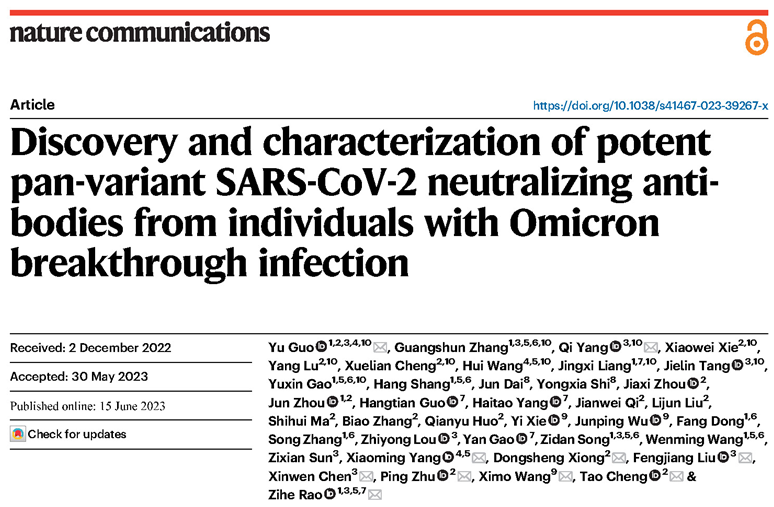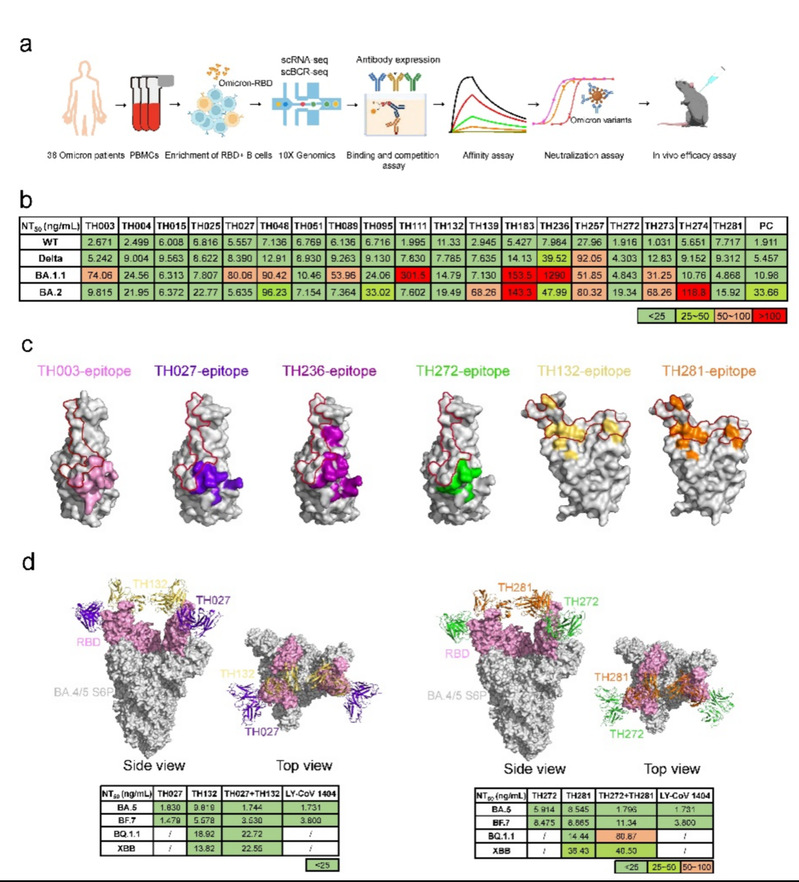The Collaborative Research Team from Nankai University Successfully Isolated a Broad and Potent Spectrum of Neutralizing Antibodies from Breakthrough Infection Cases Caused by the Omicron Variant

Recently, a collaborative research team composed of Professor Yu Guo and Professor Zihe Rao from the College of Life Sciences and the State Key Laboratory of Medical Chemical Biology of Nankai University, in conjunction with the Tianjin Cell Ecological Haihe Laboratory, Guangzhou National Laboratory, and the Beijing Institute of Biological Products of China National Pharmaceutical Group (Sinopharm), among other institutions, published a research paper titled Discovery and characterization of potent pan-variant SARS-CoV-2 neutralizing antibodies from individuals with Omicron breakthrough infection in the prestigious international academic journal, Nature Communications.
The research team successfully isolated a collection of potent and broad-spectrum elite antibodies from individuals who experienced breakthrough infections with the Omicron variant after vaccination. These antibodies demonstrate high efficacy in neutralizing various circulating strains of the novel coronavirus, including the current BQ.1.1 and XBB variants. This research provides new insights into the combination and pairing of broad-spectrum antibody drugs for epidemic prevention and control in the face of new challenges. Furthermore, the antibodies have shown promising preventive and therapeutic effects in animal models.
Neutralizing antibodies are essential factors for providing long-term immune protection after infection recovery or vaccination, serving as a key component in the defense against COVID-19. They are also effective preventive and therapeutic measures for vulnerable populations such as the elderly, individuals with pre-existing conditions, and those with compromised immune systems. However, many new variants of the coronavirus, including BF.7, BQ.1.1, XBB, have exhibited significant immune escape from most antibody drugs. Moreover, several research papers have reported that due to the original antigenic sin, individuals vaccinated with inactivated vaccines based on the original strain of the coronavirus may not generate effective antibody responses against novel variant strains following breakthrough infections.
In January 2022, Tianjin experienced the first outbreak of the BA.1 variant of the Omicron virus in China. To promptly respond to national requirements and address the scientific questions at hand, a collaborative research team comprising Nankai University, Tianjin Cell Ecological Haihe Laboratory, Guangzhou National Laboratory, and the Beijing Institute of Biological Products of China National Pharmaceutical Group (Sinopharm) was swiftly formed. The team embarked on immune response analysis of breakthrough infections and the development of neutralizing antibody drugs targeting this particular cluster of cases.
According to the results of the study, patients with breakthrough infection who were vaccinated with 2-3 doses of the domestic inactivated COVID-19 vaccine can produce a broad-spectrum, effective and long-lasting humoral immune response. Multiple potent antibodies isolated through single-cell sequencing techniques can effectively neutralize various variants such as prototype variant, Delta variant, and Omicron variant (including BA.1-BA.5, BA2.12.1). This somewhat dispels previous concerns about the “original antigenic sin”to some extent.
Subsequently, the research team further elucidated the potent and broad-spectrum neutralization mechanism of six elite antibodies through cryo-electron microscopy (cryo-EM) technology. These elite antibodies are divided into two binding modes in the receptor-binding domain (RBD), which are located outside the RBD and on the receptor binding motif (RBM). Guided by precise structural information, the research team designed a cocktail therapy with two pairs of non-competitive antibody combinations. The test proved that this therapy way can rank among the top 5% of reported antibodies worldwide in terms of neutralization activity for multiple current epidemic strains.
Finally,the mouse model infected by Omicron variant confirmed that the TH027+TH132 antibody combination has excellent preventive and therapeutic effects.

The research team isolated the selected elite antibodies in June 2022 based on accurate 3D structural information and AI-assisted pathogen evolution prediction, which maintained high affinity and efficient neutralizing activity for BF.7, BQ.1.1 and XBB variants that emerged in the subsequent year, demonstrating good potential as a drug.
Doctoral students Guangshun Zhang and Jingqian Liang from the Life Sciences College of Nankai University, associate researcher Qi Yang from Guangzhou National Laboratory, doctoral students Xiaowei Xie, Yang Lu and Xuelian Cheng from the Tianjin Haihe Cell Ecosystem Laoratory,researcher Hui Wang from the Beijing institute of biological product of Sinopharm, and others are the co-first authors of the paper. Professor Yu Guo and Professor Zihe Rao from the Life Science College of Nankai University, and the National Key Laboratory of Medicinal Chemistry and Biology, Professor Tao Cheng and Ping Zhu from the Tianjin Haihe Cell Ecosystem Laoratory , researcher Xinwen Chen and associate researcher Fengjiang Liu from the Guangzhou National Laboratory, researcher Xiaoming Yang from the Beijing Institute of biological product of Sinopharm and others are co-corresponding authors of the paper. Patent protection has been filed for relevant antibodies, which have entered the stage of achievement commercialization.
Link:https://www.nature.com/articles/s41467-023-39267-x
(Edited and Translated by Nankai News Team.)









